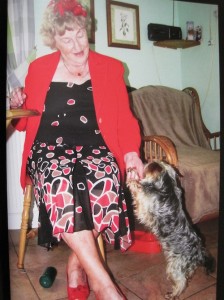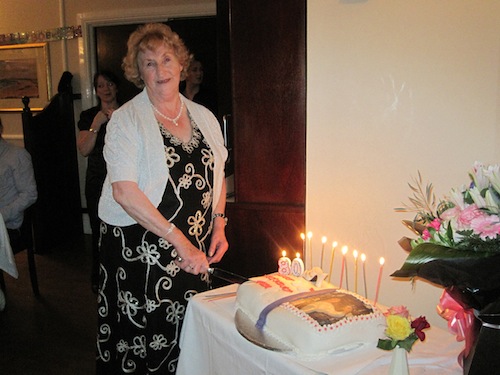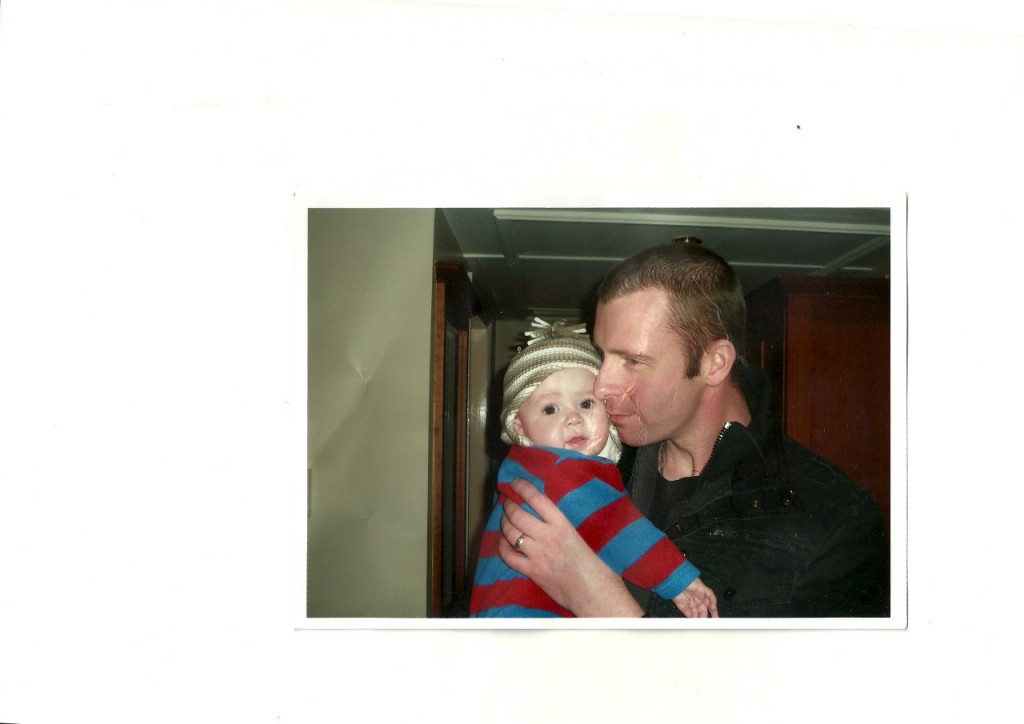An 80 year old mother of six, who has beaten cancer three times, has given fellow cancer sufferers the inspiration to keep battling the disease by telling them that life is for living today.
Brigid Bonner from Burtonport, who worked until she was 72, has now been given the all-clear from the disease.
She is amongst hundreds of people across Donegal who will come together at the LYIT in Letterkenny for the long-awaited Relay for Life.
The aim of the event, which will see more than 70 teams of four complete a 24 hour ‘relay for life’, is to both raise money and awareness for the fight against cancer.
But behind the headlines, sponsorship forms, coffee mornings and blistered feet is the many real-life stories of ordinary people across Co Donegal who have encountered the disease.
These are just two such stories.
Brigid Bonner (nee Gorry), Burtonport
“I tried not to focus on the cancer. My focus was my work. I worked and worked right throughout my three cancer diagnoses’. In fact my first question after my mastectomy was ‘when can I start hoovering?.’
Now 80-years old and living with her dog Pedro, Brigid Bonner speaks with an air of enthused confidence. Despite fighting cancer three times, Brigid remains staunch in her position that cancer ‘got at her’ but not ‘in her’.
Recollecting Christmas Day 1990, Brigid says she was devastated to find a lump in her breast. A separated mother of six – Neil 33, Patrick 32, Beatrice 31, Mary 26, Helena 21 and Joe almost 17 – she was determined to make Christmas special for her children.
Despite dancing, eating and partying that Christmas and New Year, Brigid knew her fate would entail tests and a diagnosis of some sort. Unfortunately in January that diagnosis confirmed breast cancer, a secret she kept to herself until February when she had to be admitted to hospital for surgery.
Her youngest son Joe was doing his leaving certificate, and being separated from her husband, she felt she had to get through her cancer diagnosis to ensure he got through his exams. It was her dream to see him go through third level education.
Recovering from her matectomy Brigid remembers the first time she had to look at her wound. “A nurse offered to support me but I said ‘no I’ll do it on my own.’ I looked. I cried. But I said to myself that if I kept the breast I would die. And so in that moment I accepted it and was determined to make my recover a speedy one. And I asked the doctors how soon I could get back hoovering?
“I got home after 10 days and wrote on my calendar that I would be back at work on March 10th, and I was. My resolve for life never weakened.”
Brigid worked for many years as a housekeeper for Michael Bonner in Dungloe. A job she was, and still is, very proud of. And in fact it was this job that supported her through her cancer journey. Despite being ill she desperately wanted to to support Joe through his education.
After a number of scans, Brigid was overjoyed to find out she didn’t require chemotherapy and she recovered well.
However, two years later in February 1992 she was back for her routine check-up and they found yet another lump.
“This time I had to go St. Luke’s Hospital in Dublin for radium treatment. And still I kept working. I would work Monday to Thursday and then went to St. Luke’s on the bus for my treatment.
Yet again I didn’t feel sick or tired. This I thought was most unusual. In fact when I would arrive home on a Sunday night my partner Dominic Gallagher would pick me up from the bus and we would go straight to the local pub and then go dancing.
I felt strong and content that Joe had got through college and I was on the road to recovery.”
Brigid’s other son Patrick worked in Kildare and so she stayed with him while down in Dubin for treatment. “I didn’t want to take up a valuable bed in St. Luke’s when my son was down the road in Kildare so I would commute from there for my treatment,” says Brigid.
Brigid made a remarkable recovery from this cancer and continued to work.
But once again she was struck with the devastating news of a cancer diagnosis. Two years later in 1994, after getting the alll clear at a regular check-up, she found another lump under her arm.
She had an operation to remove the cancer and was left with an open wound. “This was the hardest time of all my cancer diagnoses. The wound was under my arm and it was very sore. My other son Neil worked in London and was a friend of Professor Tim Oliver of the London Hospital. He agreed to see me and told me that I needed a full scan of my body.
“I remember him telling me that if the cancer was contained in that area, I’d live to be a very old lady, but if it wasn’t he couldn’t promise me good news.”
Another interesting diagnosis Professor Oliver gave Brigid was that her body was over-producing the hormone oestrogen. “That explained why I was never tired despite the cancer and the treatment. In fact Prof. Oliver said it could have been a contributing factor in my illness.”
Brigid was sent back to St. Luke’s and had six months of chemotherapy. Despite getting an infection in her wound under her arm she recovered and by this stage she says “my prayers were answered and Joe had finished university.”
Brigid continued working until she was 72 when her partner Dominic took a stroke and she gave up her job to care for him. Dominic passed away in July last year and Brigid describes their time together as “wonderful.”
Brigid says the hardest part of her journey was the emotional side of cancer. “I didn’t want help from anyone, I just wanted to be fit to work to put Joe through college.”
Joe is now working in London in the Houses of Parliament as a Government official.
“I am really fine now. I was at Ceili Dancing and at a quiz for Relay for Life. I do all my own housework and visit my friends. I’m happy and enjoy living each day to the full.”
Brigid has displayed an unfloudering resilience and huge appreciation for life, a reward she thanks God for every day. Life for Brigid simply means living.
Pat Ferry, Gweedore (now living in Downings)
“Cancer isn’t pushed aside. It stays with you. It’s like climbing a mountain with a back-pack and the higher you climb that mountain the lighter the load gets. And when you reach the summit, the feeling of elation is wonderful. The news that you are in remission eases the burden.”
30-year old Pat Ferry lives in Downings with his wife Mary and their 18-month old son Jack. Pat’s diagnoses of testicular, lung and stomach cancer came at a time that should have been the most joyful in his life.
A self-employed plasterer, Pat began feeling unwell in January 2010. A series of unexplained symptoms from stomach pain, acute fatigue, blurred vision and nose-bleeds to a suspected hernia were finally diagnosed as cancer on 21st August that year. The same day his wife Mary was going for her final check-up, she was 39 weeks pregnant and their first born child was due the following week.
Mary had suffered a mis-carriage the previous year so this baby was to be a very special gift for both her and Pat.
Pat was told of his cancer – testicular, with tumours also in his lungs and stomach and was given six weeks to live. He sat in stunned silence as the news was broken to him. At just 28-years old, he wondered how he was going to break the news to his wife who was due to go into labour any day.
Pat did break the news, and remembers telling Mary to go for her final check-up while he met his own medical team. Their life was suddenly turned upside down.
Pat tried to absorb the news – words of advice that the next few months would be tough, that he needed urgent surgery to prevent the tumours from spreading – just clashed with his immediate concern about being at the birth of his child.
The diagnoses was serious, doctors spoke of timeframes, Pat asked for prognosis. Right there, right then he was thrown back to when his mother was told she had just eight weeks to live after being diagnosed with liver cancer. Pat’s mother Maureen passed away six weeks after her diagnoses in 2002.
So to a large extent Pat understood the journey ahead of him, despite it being unclear as to what his own outcomes would be.
Pat was rushed to Galway for emergency surgery, but Mary couldn’t travel with him. “It was the longest journey of my life. My sister Maria came with me, but I had to leave Mary behind. That was extremely tough. All I wanted was to support her through the birth, but I knew I had to be strong for both of them.”
He had a number of CT, MRI and Ultrasound scans in University College Hospital Galway which revealed a series of tumours in his stomach and lungs with one pressing on the main artery of the heart. At this stage Pat was advised that this surgery was extremely important.
Awakening from his surgery, Pat was briefed by the medical team. They removed one of his testes but the tumours in his stomach and lungs remained. It was hoped chemotherapy would deal with these tumours.
Pat was sent home after two days but was quickly re-admitted to Letterkenny General Hospital after suffering acute illness.
Then the medical team made a decision to take Mary in for a c-section so that Pat could see his new baby before they started him on chemotherapy.
“On Tuesday 31st August I was brought up to maternity at 8.30am; at 9.10am our son Jack was born and at 10.00am I had started chemotherapy. It was hard to take it all in, but I knew time wasn’t on my side, so the doctors made the decisions to help us as a family.”
Pat began an aggressive four-month programme of chemotherapy and suffered through this with a series of side affects. While he struggled in many ways, he says being a father suddenly gave him the strength to fight his diagnoses.
“I asked myself – ‘do I let it beat me or do I take it on’? I saw the sun rise one morning and in this moment I told myself I needed to get through this, to take everybody’s help and let everybody pray for me..
I wanted to be at home for Mary and Jack, that I was a dad now. And I also told myself that I’d give us a trip to Canada.”
Pat finished his chemotherapy at the end of November 2011. On 23rd December he went for his scan results. He was told that the chemotherapy had worked on 70% of the tumours, but that some still remained. He was told he would need further chemotherapy and possible surgery, so that news consumed his thoughts that Christmas.
On January 7th 2011, Pat was referred to Galway. This was exactly one year since he started experiecning his first cancer symtoms. I had a scan and afterwards the nurse told me to book a holiday.
“Your tumours are gone, but one remains in the lung, but it’s dormant.”
Pat says, “it was like winning the lottery. I got a great energy boost and worked four hours and I felt like a man again. I told myself it was a great outcome if it meant that I could go out and work and feel great afterwards. It was so long since I felt ‘normal.’ The stubble was growing back and my hair was growing back. I felt very positive in myself.”
Pat, Mary and Jack will take that trip to Canada next month, their first family holiday, but more importantly than that, Pat will fulfil his promise to himself at the beginning of his cancer journey.
Describing his journey over the past 18 months, Pat says, “I saw a lot of young people who had travelled the same journey. My best advice to anyone who finds themselves in my shoes is: ‘you will have your ups and downs, but you can get through it. I am a walking example of it.”
He says, “I’m more positive about life. Cancer is something you don’t push aside. It stays with you. It’s like climbing a mountain with a back-pack and the higher you climb that mountain the lighter the load gets. And when you reach the summit, the feeling of elation is wonderful. The news that you are in remission eases the burden.”
Pat has also made some other changes in his life due to his cancer journey. He has changed career and is now training as a Special Needs Assistant at Milford VEC and is looking forward to pursuing a career in the caring professions.
Tags:







